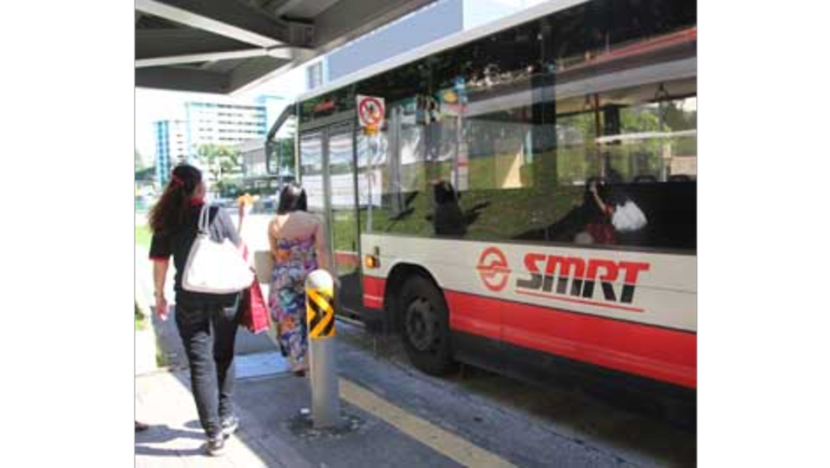Public raises concerns over S$1.1b bus expenditure
The Singapore government feedback portal, REACH has received more than 600 views on Budget 2012 since 17 February, the day the Budget was announced.

File photo of a SMRT bus. (Photo: Hester Tan)
SINGAPORE: Singapore government feedback portal REACH has received more than 600 views on Budget 2012 since 17 February, the day the Budget was announced.
REACH chairperson and Minister of State for Health Amy Khor said many contributors like the Budget.
Kicking off the second day of debate on the Budget speech, she added there are some concerns the government can address.
One area is that the Budget has set aside funds to acquire 550 buses, and keep them running for 10 years.
Dr Khor revealed there is significant resentment that public funds are being used to boost bus capacity even though doing so to improve service level is welcomed.
She noted the government had always maintained the privatisation model is the best way to ensure that the public transport system operates effectively and efficiently.
And given their size and credit standing, the publicly-listed bus companies can quite easily raise funds via bond or share issues to buy the buses.
However, Member of Parliament (MP) for Pasir Ris-Punggol Group Representation Constituency (GRC) Janil Puthucheary said Singapore should either fully nationalise or privatise its public transport services.
Dr Puthucheary wanted to know how the spending would ensure a return of investment that would benefit citizens and not shareholders.
Wondering if the move is "a creeping nationalisation" of Singapore's transport services, Dr Puthucheary said a hybrid transport model may not be the best way forward, as public transport companies have to operate under significant constraints while having to make profits.
He argued full nationalisation would benefit commuters, with lower fares and better availability of services, but may be expensive and inefficient
On the other hand, privatisation by deregulating the market would allow for true consumer choice and competition.
"We are neither properly privatised nor adequately nationalised. In the past, this hybrid model has been held up as an exemplar of what was possible with good governance," Dr Puthucheary said.
"It may represent the best of both worlds, but has recently been interpreted as the worst of both models. Can the House and the public be assured that this hybridisation continues to be the best way forward for Singapore?"
Dr Khor said many people cannot fathom the logic for the direct use of public funds to ramp up bus capacity.
Dr Khor said: "Moreover, it is argued that these companies have been making substantial profits over the years even though their bus business may be running operating losses."
Dr Khor stressed if the S$1.1 billion subsidy is inevitable, then the government must have strict oversight over these operators and impose conditions to ensure Singapore achieves the desired service level improvements and the extra money does not go toward boosting dividends or share prices.
And these conditions should be made known to the public.
Opposition MP Pritam Singh raised concerns that shareholders of publicly-listed bus operators SBS Transit and SMRT are benefiting from the Bus Services Enhancement Fund.
He said: "Many Singaporeans are asking why the shareholders of our publicly-listed bus operators are being extended this unusual generosity by the government?"
Mr Pritam Singh, who is an MP for Aljunied GRC, urged the government to "claw back" the $1.1 billion over a fixed period of time after consultation with SBS Transit and SMRT.
He also called for a step-by-step breakdown of how the money in the fund will be used.
Mr Pritam Singh said: "Taking into account inflation over the last two years, I hope this government gives the public a detailed breakdown of the operating cost and the salary component that was set aside for the Bus Services Enhancement Fund, in addition to all other components that may not have been publicly revealed so far.
"Too much of this dispensation of taxpayer dollar to these two profit-generating monopolies, quasi monopolies, I beg your pardon, is currently unknown to the public beyond the big figure and some transparency would be very helpful."
Turning to the move to increase CPF contributions for workers aged 50 to 65 years to encourage them to continue working, Dr Khor said feedback contributors have welcomed this announcement.
However, it can be argued that since people are becoming more educated and skilled, living longer and healthier, the CPF contribution rates should be similar for all workers, regardless of age and should be extended beyond 65 years old.
Otherwise, the signal would still be that older workers are less valued.
For businesses, Dr Khor said the criticisms to Budget 2012 have been sharper.
There are few objections towards the statement that Singapore needs to reduce its reliance on foreign workers and steer its economy toward higher productivity.
But, businesses feel growing productivity takes time and replacing foreign workers with more locals in a tight labour market will be extremely challenging in the short to medium term.
Hence, there are concerns the shortage of foreign labour may hurt small businesses and eventually increase costs for everyone.
Dr Khor said: "Besides the measures announced in Budget 2012 to incentivise companies to improve productivity, the government will need to work closely with the various industry sectors to change mindsets and more aggressively drive productivity initiatives.
"Employers will also have to make concerted effort to adapt their work processes to include more flexible work hours and better HR policies and pay structures to accommodate older workers and other untapped labour pools such as back-to-work women.
"Here, the government could take the lead by employing older workers and back- to-work women across all ministries and agencies."
Dr Khor, who is also mayor of the South West CDC, explained that from the point of view of depicting priorities, Budget 2012 indicated a stepped-up response to realities that have asserted themselves more and more forcefully.
She said the opposition would like to think that Budget 2012 is a reaction to the General Election last year.
But Dr Khor believed deeper forces are at work.
She said while Singapore has one of the highest percentage of millionaires in the world, the lower segments of the population find it difficult to pull themselves out of their difficulties.
Dr Khor said: "It will be foolish to jettison the dogma of globalisation and free markets because it has brought enormous benefits to Singapore.
"Millions have been uplifted from their poverty in many countries that have embraced market reforms and plugged their economies into the global trading system.
But, we need to address the inequalities which plague dense cities like Singapore."
And the government's decision to raise the social allocation even further in this year's Budget was a responsive move to emerging social trends although some opposition members would label it a populist move.
Dr Khor said this is not a course correction as suggested by the MP for Aljunied GRC Sylvia Lim, on Tuesday.
Dr Khor said it is the reinforcement of an existing policy and what Budget 2012 implied was a further loosening of the purse strings to help the most vulnerable segments of the population, with full awareness that the help they receive may be prolonged over many budget cycles.
Dr Khor said: "Indeed, Budget 2012 signals in my view, a fresh approach the government has taken in cognizance of these social realities.
"It is a fresh approach because the government has brought to bear substantially more funds than hitherto to try and decisively tackle the income gap. Hence, we have a permanent GST voucher scheme."
38 Members of Parliament are due to make their speeches on the Budget on Wednesday with Deputy Prime Minister and Minister for Finance Tharman Shanmugaratnam replying to MPs' concerns on Thursday.











